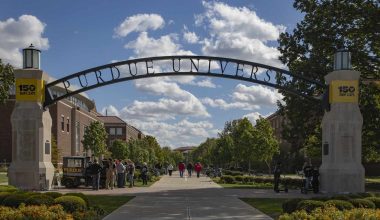Ever thought about speeding through college and graduating early? It sounds pretty awesome, right? Less time spent studying, more time to, well, do whatever you want! But hold on a second, what are the pros and cons of this decision?
In this article, we will explore the concept of graduating college early, including its benefits, challenges, and strategies for achieving this goal. By providing a comprehensive overview of the topic, we aim to equip you with the information you need to make an informed decision about whether early graduation aligns with your goals and aspirations.
While giving you the reasons graduating college early can be a valuable choice, we’ll also be honest about the potential downsides, like missing out on some cool college experiences and feeling a little burnt out from all that studying and everything else you need to keep in mind.
So, let’s help you pull through this important decision.
Table of contents
- Can You Graduate College Early?
- Benefits of Graduating from College Early
- Cons of Graduating College Early
- Strategies for Graduating College Early
- Time Management and Planning
- Course Overload and Credit Accumulation
- Summer and Intersession Courses
- Dual Enrollment and Advanced Placement (AP) Credits
- CLEP Exams and Credit by Examination
- Seeking Academic Advising and Support
- Financial Considerations
- Balancing Academics and Extracurricular Activities
- Maintaining a Healthy Work-Life Balance
- How Does Graduating College Early Affect Grad School Admissions?
- Is Graduating Early Worth It?
- FAQs on Graduating College Early
- Conclusion
- References
- Recommendations
Can You Graduate College Early?
Graduating college early is an attainable goal that requires careful planning and coordination with your academic advisor. By taking a heavier course load, enrolling in summer or winter session courses, and utilizing alternative credit options, you can accumulate credits faster and make progress toward your degree more quickly.
However, it’s important to strike a balance and ensure that you can handle the increased workload without compromising your academic performance or well-being. Consulting with your academic advisor is crucial to ensure you are on track to meet all graduation requirements and to navigate any specific policies or opportunities at your institution.
While early graduation offers several advantages, such as saving time and potentially money, launching your career or further educational pursuits sooner, and showing determination and goal orientation to employers, it’s important to consider the potential trade-offs.
Graduating early may limit your opportunities to explore elective courses or engage in extracurricular activities, which are valuable aspects of the college experience. Therefore, finding a balance that allows you to pursue your academic goals while enjoying a fulfilling college experience is key.
Read also: What are Credit Hours in College? How Does it Work?
Benefits of Graduating from College Early
1. Time and Money Savings
Graduating college early allows you to save both time and money. By completing your degree in a shorter time frame, you can avoid additional tuition fees and living expenses. You can also enter the workforce earlier, potentially earning a higher income and gaining a head start on your career.
2. Competitive Edge
In a highly competitive job market, graduating college early can give you an advantage over other candidates. It demonstrates your ability to handle a rigorous academic workload and showcases your dedication and drive. Employers often value candidates who have demonstrated initiative and a strong work ethic.
3. Accelerated Career Progression
By entering the professional world sooner, you have the opportunity to gain valuable work experience and progress in your career at a faster rate.
You can start building your professional network, developing important skills, and taking on leadership roles earlier than your peers. This early career progression can lead to increased job opportunities and the potential for higher salaries in the long run.
4. Flexibility and Exploration
Graduating college early gives you more flexibility in shaping your future. You can choose to pursue higher education, embark on entrepreneurial ventures, or explore different career paths.
The additional time you gain can be used for internships, volunteering, or travelling, allowing you to gain diverse experiences and broaden your horizons.
Read also: Graduating High School a Year Early in 2024 | Benefits
Cons of Graduating College Early
1. Limited College Experience
Graduating college early means missing out on certain aspects of the traditional college experience.
You might have fewer opportunities to participate in extracurricular activities, join clubs, or form long-lasting friendships. College is not only about academics; it offers a unique environment for personal growth and self-discovery.
2. Lack of Maturity and Life Skills
The college provides an environment for students to develop important life skills and mature emotionally.
By rushing through your college education, you may miss out on valuable experiences that contribute to personal growth. These experiences include learning to navigate different social situations, developing critical thinking skills, and becoming independent.
3. Missed Networking Opportunities
Staying in college for the traditional duration allows you to build strong relationships with professors, classmates, and alumni. These connections can be valuable throughout your professional career.
Graduating early may limit your networking opportunities, potentially impacting your ability to access mentorship, job referrals, and a supportive professional network.
4. Uncertainty and Rushed Decision-Making
Deciding to graduate college early requires careful consideration. Rushing this decision without fully exploring your academic options and career goals can lead to uncertainty and regret.
It’s important to evaluate whether graduating early aligns with your long-term aspirations and whether you have adequately explored all your interests and passions.
Read also: What is the Difference Between Graduate Software Developer and Software Developer at Booking.com?
Strategies for Graduating College Early
To successfully graduate college early, you need to adopt effective strategies. Here are some key approaches to consider:
Time Management and Planning
Develop a comprehensive plan outlining the courses you need to complete, their prerequisites, and the expected workload. Create a realistic timeline that considers your capacity and other commitments. Utilize time management techniques such as setting priorities, creating to-do lists, and maintaining a balanced schedule.
Course Overload and Credit Accumulation
Consider taking extra courses each semester to accumulate credits faster. However, be mindful of your capabilities and ensure you can handle the increased workload without compromising your academic performance.
Summer and Intersession Courses
Take advantage of summer and intersession courses offered by your college or other institutions. These condensed sessions can allow you to earn credits at an accelerated pace and make significant progress toward early graduation.
Dual Enrollment and Advanced Placement (AP) Credits
If available, participate in dual enrollment programs during high school to earn college credits in advance. Additionally, take AP courses and exams to potentially receive college credit, allowing you to bypass certain introductory-level courses.
CLEP Exams and Credit by Examination
Explore the option of taking College-Level Examination Program (CLEP) exams to demonstrate your proficiency in specific subjects. By passing these exams, you can earn college credits and expedite your progress toward graduation.
Seeking Academic Advising and Support
Consult with your academic advisor regularly to ensure you’re on track and taking the necessary steps to graduate early. They can provide guidance, recommend suitable courses, and assist you in navigating any challenges that may arise.
Financial Considerations
Evaluate the financial implications of graduating college early. While it can save you money on tuition and living expenses, be mindful of potential reductions in financial aid or scholarships due to an altered timeline. Plan your budget accordingly and explore available scholarships or grants for early graduates.
Balancing Academics and Extracurricular Activities
Maintaining a balance between academics and extracurricular activities is crucial for overall personal and professional development. While focusing on your studies is important, don’t overlook the value of participating in clubs, sports, or community service. These experiences contribute to a well-rounded education and can enhance your resume.
Maintaining a Healthy Work-Life Balance
Graduating early requires dedication and hard work, but it’s essential to prioritize your well-being. Make time for self-care, relaxation, and social activities to avoid burnout. Balancing your academic pursuits with a healthy work-life balance will contribute to your long-term success.
Read also: Should I Bring My PC to College? A Comprehensive Guide
How Does Graduating College Early Affect Grad School Admissions?
Graduating college early can have mixed effects on grad school admissions. On the positive side, it demonstrates initiative, academic excellence, and the ability to handle a rigorous workload. Admissions committees value motivated candidates who excel academically and actively engage in research or internships.
However, early graduation may limit course options and potentially reduce exposure to certain subjects, which could affect the breadth of knowledge expected for graduate studies. Some programs also value the personal growth and development that comes from a traditional four-year college experience, including involvement in extracurricular activities and leadership roles.
To offset any concerns, it’s important to maximize your time in college by actively participating in relevant experiences and obtaining strong letters of recommendation. Ultimately, the impact of early graduation on grad school admissions will depend on the specific program and its criteria. It’s crucial to research and tailor your application to highlight your strengths, passion, and readiness for advanced studies.
Is Graduating Early Worth It?
Graduating college early can be a worthwhile choice, depending on individual circumstances and priorities. The benefits include time and cost savings, as entering the workforce earlier allows for faster loan repayment and the ability to start saving for future goals.
Early graduates often have a competitive advantage, gaining more work experience and better career advancement opportunities. Another advantage is the flexibility and freedom to shape one’s future, whether it’s pursuing further education, exploring different career paths, or taking time off for personal projects.
Achieving an early graduation goal can also bring personal fulfilment and boost self-confidence. However, potential downsides, such as heavier workloads and limited time for extracurricular activities, should be considered. Some fields may prioritize internships and networking, so it’s essential to assess whether early graduation aligns with long-term goals. Ultimately, the decision should be based on personal circumstances and balancing academic, career, and well-being considerations.
Read also: Bad Time Simulator Unblocked Games For School Students in 2024
FAQs on Graduating College Early
Graduating college early does not guarantee a job. While it can provide you with a competitive edge, securing employment still depends on various factors, such as the job market, your qualifications, and the demands of the industry.
Yes, you can still enjoy networking benefits if you graduate college early. However, you might need to be proactive in building professional connections through internships, industry events, and online platforms like LinkedIn.
If you graduate college early, you can still engage in extracurricular activities, join professional organizations, and attend workshops or seminars related to your field of interest. Additionally, you can seek mentorship opportunities or participate in community programs to enhance your personal growth.
The decision between graduating early and taking your time in college depends on your circumstances, goals, and priorities. Consider the potential benefits and drawbacks outlined in this article and evaluate which aligns better with your long-term aspirations.
Graduating college early is not the right choice for everyone. It depends on individual preferences, career aspirations, and the specific academic program. It’s essential to carefully weigh the pros and cons and make an informed decision that aligns with your goals and values.
Conclusion
The decision to graduate college early is a personal one, and it comes with its own set of pros and cons. While it offers advantages such as time and money savings, a competitive edge, accelerated career progression, and flexibility, there are also potential drawbacks like the limited college experience, a lack of maturity and life skills, missed networking opportunities and rushed decision-making.
Before making a final decision, consider your priorities, goals, and the potential impact on your personal and professional development.
References
- Joinjuno.com – Pros and Cons of Graduating From College Early
- Indeed.com – Graduating Early: Pros, Cons, and Resources





